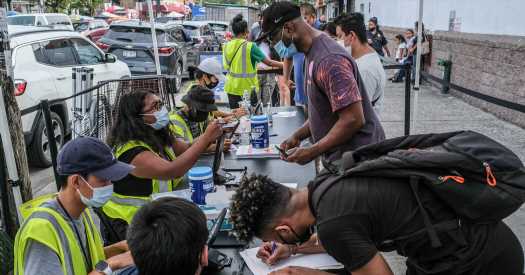An independent panel advising the Centers for Disease Control and Prevention on Friday recommended third doses of coronavirus vaccine for certain people with weakened immune systems, giving more backing to doctors and patients considering the opportunity for extra protection.
The recommendation came a day after the Food and Drug Administration authorized third doses for people with solid organ transplants and others with similarly weakened immune systems.
After nearly three hours of presentations and discussion, the committee of medical experts voted unanimously to recommend third shots for people in this group who have already received the two-dose vaccines made by Pfizer-BioNTech or Moderna.
While the panel’s guidance is nonbinding, it is followed closely by physicians and public health departments. The vote is expected to be followed by a formal recommendation from the C.D.C.
About three percent of Americans have weakened immune systems for a variety of reasons, from a history of cancer to the use of certain medications such as steroids.
The group now eligible for third shots would include people with advanced or untreated H.I.V. infection, those who have undergone certain types of stem cell transplants within the past two years and those receiving certain kinds of chemotherapy, among others, Dr. Neela D. Goswami, a C.D.C. official, said.
Patients slated for treatments that weaken the immune system should get a third dose before they begin, Dr. Goswami said. And everyone eligible for a third shot should wait at least 28 days after their second dose before getting it, according to the C.D.C.
People will not need a doctor’s permission or a prescription to get a third shot, C.D.C. officials said; they will need only to attest that they meet the eligibility requirements for an additional dose. Anyone else, including people with chronic medical conditions, like diabetes or asthma, should not be getting third shots at this point, they said.
The updated F.D.A. authorizations do not apply to patients who received the single-dose Johnson & Johnson vaccine, and the C.D.C. panel did not recommend additional shots for members of that group, leaving them in limbo. Officials say they are waiting for more data from clinical trials.
Dr. Kathleen Dooling, a C.D.C. official, said that patients who qualify for a third dose should ideally seek out the vaccine they already received, but that they could take the other two-dose vaccine if the first was unavailable.
Dr. Dooling emphasized that immunocompromised people who receive a third dose should still wear a mask, maintain social distancing with people they do not live with, and avoid crowds and poorly ventilated indoor spaces. People with weakened immune systems face a higher risk of breakthrough infections and severe Covid-19.
Understand the State of Vaccine and Mask Mandates in the U.S.
- Mask rules. The Centers for Disease Control and Prevention in July recommended that all Americans, regardless of vaccination status, wear masks in indoor public places within areas experiencing outbreaks, a reversal of the guidance it offered in May. See where the C.D.C. guidance would apply, and where states have instituted their own mask policies. The battle over masks has become contentious in some states, with some local leaders defying state bans.
- Vaccine rules . . . and businesses. Private companies are increasingly mandating coronavirus vaccines for employees, with varying approaches. Such mandates are legally allowed and have been upheld in court challenges.
- College and universities. More than 400 colleges and universities are requiring students to be vaccinated against Covid-19. Almost all are in states that voted for President Biden.
- Schools. On Aug. 11, California announced that it would require teachers and staff of both public and private schools to be vaccinated or face regular testing, the first state in the nation to do so. A survey released in August found that many American parents of school-age children are opposed to mandated vaccines for students, but were more supportive of mask mandates for students, teachers and staff members who do not have their shots.
- Hospitals and medical centers. Many hospitals and major health systems are requiring employees to get a Covid-19 vaccine, citing rising caseloads fueled by the Delta variant and stubbornly low vaccination rates in their communities, even within their work force.
- New York. On Aug. 3, Mayor Bill de Blasio of New York announced that proof of vaccination would be required of workers and customers for indoor dining, gyms, performances and other indoor situations, becoming the first U.S. city to require vaccines for a broad range of activities. City hospital workers must also get a vaccine or be subjected to weekly testing. Similar rules are in place for New York State employees.
- At the federal level. The Pentagon announced that it would seek to make coronavirus vaccinations mandatory for the country’s 1.3 million active-duty troops “no later” than the middle of September. President Biden announced that all civilian federal employees would have to be vaccinated against the coronavirus or submit to regular testing, social distancing, mask requirements and restrictions on most travel.
Source: Read Full Article





